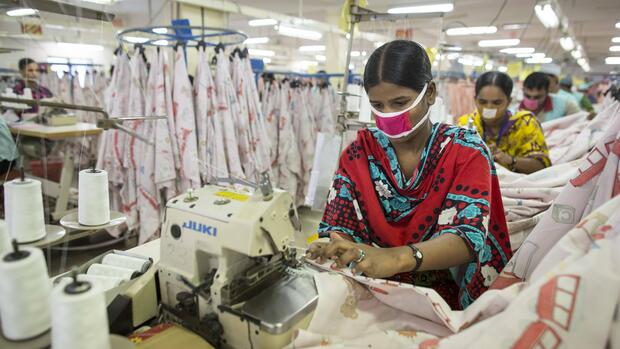Dusseldorf Human rights organizations have lodged complaints with the Federal Office of Economics and Export Control (BAFA) against retailers Amazon and Ikea. They accuse the two companies of violating the German Supply Chain Due Diligence Act. It is the first complaint based on the law that has been in force since the beginning of the year.
If Bafa also sees a violation, it can be very expensive for the company. The law provides for fines of up to two percent of global annual sales. At Ikea, this limit would be around 800 million euros, and at Amazon, in extreme cases, up to ten billion euros would be possible.
The German Supply Chain Due Diligence Act does not offer the associations a direct right to sue, which many companies were afraid of. But the EU is currently working on an even stricter regulation. After that, those affected should be able to sue in the courts of the EU states. In the event of breaches of duty, penalties of up to five percent of global sales should even be possible.
The organizations ECCHR and Femnet criticize, among other things, that the traders have not signed the so-called Bangladesh Accord, an agreement intended to improve safety in the country’s textile factories. In addition, safety deficiencies and labor law violations were found in factories that supply Amazon and Ikea.
On request, Bafa stated that it “basically cannot provide any information on any complaints against individual companies”. In general, however, every complaint is checked thoroughly and individually by Bafa.
Ikea wants to cooperate with the authorities
ECCHR and Femnet filed the complaint jointly with Bangladesh’s National Garment Workers Federation (NGWF). During research in March 2023, the NGWF found safety deficiencies such as a lack of inspections, but also violations of labor rights such as a lack of freedom of union. The Supply Chain Act also obliges companies with more than 3,000 employees in Germany to comply with the rights of employees along their supply chain.
Ikea branch: The Swedish furniture giant is having problems because of the German supply chain law.
(Photo: IMAGO/ITAR-TASS)
Amazon declined to comment on the specific allegations. In principle, however, the company has undertaken to ensure that all products offered are manufactured in compliance with human rights and the environment, said a spokeswoman. There are clear requirements for suppliers that are set out in the supply chain standards.
Ikea announced that the company did not yet have any information from Bafa in the specific case. Therefore, it could “not yet comment in detail on the allegations at the current time,” as a spokeswoman explained.
She said: “As soon as we become aware of grievances, we immediately start the investigation and are of course cooperative in working with the authorities.” The spokeswoman emphasized that Ikea under no circumstances accept violations of human rights, working conditions or safety standards in the supply chain.
>> Read also: Many companies are poorly prepared for the supply chain law
Exactly ten years ago, the Rana Plaza textile factory in Bangladesh collapsed. More than 1100 people lost their lives. Immediately afterwards, numerous Western fashion groups signed the Bangladesh Accord. The agreement with the textile workers’ unions stipulates, among other things, clearly defined safety standards for the factories from which the fashion companies order and makes regular inspections mandatory.
Ten years ago, more than 1,100 people died when this factory in Bangladesh collapsed.
(Photo: dpa)
More than 1,400 factories in Bangladesh with a total of 2.2 million employees are now covered and controlled by the Accord. The companies that have signed the agreement are only allowed to produce in these factories. To date, more than 190 fashion companies have signed the Accord.
Ikea is not one of them. When asked, the company said it welcomes commitments to improve standards and working conditions, but will remain independent of such international agreements. The company believes that its own systems put it in the best position to improve and strengthen conditions in the manufacturing sector.
Femnet and ECCHR disagree. “We are convinced that failure to sign constitutes a breach of corporate due diligence,” says Miriam Saage-Maass, Attorney and Legal Director of ECCHR.
“Companies should take reports of violations very seriously”
Attorney Lothar Harings disagrees. “Of course, companies can also make individual agreements with their suppliers,” says the Hamburg expert from the law firm Graf von Westphalen, who advises several textile companies on the design of their supply chain. “The Accord is certainly a suitable preventive measure, but it is not the only preventive measure that is conceivable,” he explains. The law deliberately does not provide any blanket solutions.
In addition, the companies concerned should now compare their own system for controlling their suppliers with the Bangladesh Accord. “If their own system meets or exceeds the requirements of the Accord, they should have nothing to worry about.”
>> Read also: Start-up Integrity Next discovers risks in the supply chain
Nevertheless, he warns that complaints at Bafa should not be taken lightly. “If the complaints are sufficiently specific, there may be an investigation by Bafa,” said the expert. “Companies then face fines.”
However, the authority must observe the principle of proportionality when it comes to the amount of the fines. “The first fines will not go anywhere near the maximum limits,” Harings is certain. “We will only come close to the maximum limits,” says the expert, “if there are repeated violations against our better judgment and aggravating circumstances, such as irreparable damage.”
More: These are the lessons Kik learned from the fire disaster in Pakistan.
